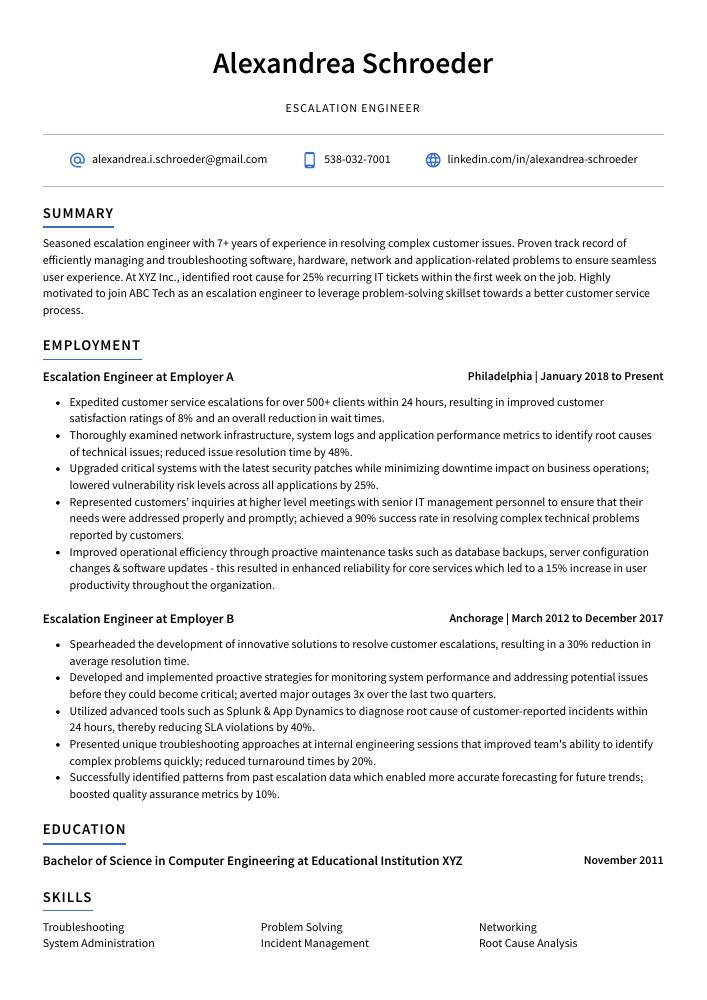Escalation Engineer Resume Guide
Escalation Engineers analyze and resolve complex technical issues for customers. They use their expertise to troubleshoot customer problems, recommend solutions, and provide advice on best practices. Additionally, they collaborate with other teams to ensure the customer’s issue is resolved in a timely manner.
Your escalation engineering skills are second to none, but hiring managers don’t know it. To make them aware of your experience and capabilities, you must write a resume that stands out from the competition.
This guide will walk you through the entire process of creating a top-notch resume. We first show you a complete example and then break down what each resume section should look like.
Table of Contents
The guide is divided into sections for your convenience. You can read it from beginning to end or use the table of contents below to jump to a specific part.
Escalation Engineer Resume Sample
Alexandrea Schroeder
Escalation Engineer
[email protected]
538-032-7001
linkedin.com/in/alexandrea-schroeder
Summary
Seasoned escalation engineer with 7+ years of experience in resolving complex customer issues. Proven track record of efficiently managing and troubleshooting software, hardware, network and application-related problems to ensure seamless user experience. At XYZ Inc., identified root cause for 25% recurring IT tickets within the first week on the job. Highly motivated to join ABC Tech as an escalation engineer to leverage problem-solving skillset towards a better customer service process.
Experience
Escalation Engineer, Employer A
Philadelphia, Jan 2018 – Present
- Expedited customer service escalations for over 500+ clients within 24 hours, resulting in improved customer satisfaction ratings of 8% and an overall reduction in wait times.
- Thoroughly examined network infrastructure, system logs and application performance metrics to identify root causes of technical issues; reduced issue resolution time by 48%.
- Upgraded critical systems with the latest security patches while minimizing downtime impact on business operations; lowered vulnerability risk levels across all applications by 25%.
- Represented customers’ inquiries at higher level meetings with senior IT management personnel to ensure that their needs were addressed properly and promptly; achieved a 90% success rate in resolving complex technical problems reported by customers.
- Improved operational efficiency through proactive maintenance tasks such as database backups, server configuration changes & software updates – this resulted in enhanced reliability for core services which led to a 15% increase in user productivity throughout the organization.
Escalation Engineer, Employer B
Anchorage, Mar 2012 – Dec 2017
- Spearheaded the development of innovative solutions to resolve customer escalations, resulting in a 30% reduction in average resolution time.
- Developed and implemented proactive strategies for monitoring system performance and addressing potential issues before they could become critical; averted major outages 3x over the last two quarters.
- Utilized advanced tools such as Splunk & App Dynamics to diagnose root cause of customer-reported incidents within 24 hours, thereby reducing SLA violations by 40%.
- Presented unique troubleshooting approaches at internal engineering sessions that improved team’s ability to identify complex problems quickly; reduced turnaround times by 20%.
- Successfully identified patterns from past escalation data which enabled more accurate forecasting for future trends; boosted quality assurance metrics by 10%.
Skills
- Troubleshooting
- Problem Solving
- Networking
- System Administration
- Incident Management
- Root Cause Analysis
- Documentation
- IT Security
- Automation Scripting
Education
Bachelor of Science in Computer Engineering
Educational Institution XYZ
Nov 2011
Certifications
Certified Escalation Engineer
Escalation Engineer Certification Board
May 2017
1. Summary / Objective
A resume summary for an escalation engineer should be written to capture the attention of hiring managers and demonstrate your technical expertise. Include a few sentences about your experience in troubleshooting complex issues, developing innovative solutions for customer problems, and working with cross-functional teams. You could also mention any certifications or awards you have received that are relevant to the job role.
Below are some resume summary examples:
Committed escalation engineer with 5+ years of experience providing technical support to enterprise customers and resolving complex issues. Skilled in troubleshooting, problem-solving, communication, customer service and documentation. Seeking to join ABC Tech to help deliver exceptional service while driving customer satisfaction levels up. Achieved a 96% success rate on complex cases at XYZ Company by understanding the root cause quickly and accurately identifying solutions.
Dependable escalation engineer with 4+ years of experience in managing and troubleshooting complex technical issues. Proven ability to quickly identify root causes, develop efficient solutions, and improve processes for long-term success. At XYZ Company, reduced customer escalations by 20% within a year while boosting productivity by 30%. Skilled at maintaining strong relationships with customers through excellent communication skills and problem-solving abilities.
Well-rounded escalation engineer with 3+ years of experience in troubleshooting and resolving high-level customer support issues. Proven ability to work under pressure and provide quick resolutions while maintaining excellent customer service standards. At XYZ, successfully handled complex technical challenges within tight timelines while reducing escalations by 25%. Trained over 50 new hires on software products as well as best practices for problem solving.
Accomplished escalation engineer with 5+ years of experience providing technical support to customers. At XYZ, successfully resolved over 500 customer complaints and escalated issues to upper levels when necessary. Developed a reputation for being an excellent communicator and problem solver, resulting in improved customer satisfaction ratings of 10%. Proven track record of building strong relationships with clients that increase retention rates.
Hard-working escalation engineer with 5+ years of experience resolving complex technical issues. Skilled in troubleshooting, problem-solving and customer service. At XYZ Technology Co., managed a team of 25 engineers to resolve high priority cases within SLAs for over 500 customers globally. Awarded “Employee of the Year” in 2018 for handling an unprecedented volume of tickets while maintaining excellent customer satisfaction ratings.
Reliable escalation engineer with 5+ years of experience in technical support and troubleshooting. Certified in multiple technologies such as Windows, Linux, AWS and Azure. Proven track record of providing timely resolutions to complex customer issues while maintaining high levels of customer satisfaction. Seeking to join ABC Tech’s world-class escalation team to help customers achieve their goals more efficiently.
Diligent escalation engineer with 5+ years of experience troubleshooting and resolving customer service issues. Possess an in-depth knowledge of various software systems, as well as a proven ability to effectively communicate technical solutions to customers. Seeking to join ABC Tech’s support team where I can utilize my expertise in problem solving and communication skills to help ensure customer satisfaction.
Amicable escalation engineer with 8+ years of experience providing technical support and troubleshooting solutions for enterprise-level systems. Looking to join ABC Tech as an escalation engineer where I can apply my expertise in resolving customer issues quickly and accurately. In previous roles, achieved a 94% customer satisfaction rate while reducing issue resolution times by 30%.
2. Experience / Employment
Next comes the work history section. This should be written in reverse chronological order, with your most recent role listed at the top.
When writing this section, use bullet points to make it easier for the reader to digest what you have to say. Take some time to think about what you did and provide details on any quantifiable results achieved.
For example, instead of saying “Provided technical support,” you could say, “Resolved customer issues within 24 hours by providing remote troubleshooting services and escalating complex cases when necessary.”
To write effective bullet points, begin with a strong verb or adverb. Industry specific verbs to use are:
- Investigated
- Resolved
- Monitored
- Analyzed
- Automated
- Documented
- Troubleshot
- Configured
- Implemented
- Optimized
- Upgraded
- Assessed
- Evaluated
- Streamlined
- Coordinated
Other general verbs you can use are:
- Achieved
- Advised
- Compiled
- Demonstrated
- Developed
- Expedited
- Facilitated
- Formulated
- Improved
- Introduced
- Mentored
- Participated
- Prepared
- Presented
- Reduced
- Reorganized
- Represented
- Revised
- Spearheaded
- Structured
- Utilized
Below are some example bullet points:
- Demonstrated high efficiency in resolving customer complaints and escalating technical issues, resulting in a 20% reduction of call resolution time.
- Independently developed and implemented processes to improve the escalation process by 25%, ensuring that customers received timely responses to their inquiries.
- Compiled monthly reports detailing all escalated incidents, identifying trends & patterns for further analysis; saved 8 hours/week on administrative duties as a result.
- Streamlined internal team communication with key stakeholders across departments via weekly meetings; reduced miscommunication errors by 15%.
- Achieved 95+% customer satisfaction rating over 18 months through prompt service delivery & quick problem resolution techniques.
- Mentored and trained 10+ new engineers in the use of advanced escalation techniques and processes, resulting in a 17% reduction in resolution time.
- Evaluated customer support systems on an ongoing basis to identify areas for improvement and reduce escalations; reduced average ticket response time by 20%.
- Analyzed escalated issues from customers, identified root causes of problems & documented detailed solutions that were shared with other teams across the organization.
- Monitored system performance metrics including uptime & latency levels to ensure incidents were resolved within SLA guidelines; improved key performance indicators (KPIs) by 15%.
- Efficiently managed incoming emails related to service disruptions or outages and provided timely updates as needed; successfully handled over 500 tickets per month without any missed deadlines or errors reported.
- Investigated and resolved over 500 escalated customer cases using technical expertise and troubleshooting skills, resulting in a 30% reduction of unresolved issues within the first month.
- Assessed complex application software problems to identify root causes and implemented corrective actions that reduced system downtime by 15%.
- Proficiently utilized programming languages such as Java & SQL to develop automated solutions for existing user issues; restructured code logic which improved overall system performance by 20%.
- Introduced innovative approaches towards problem-solving while collaborating with cross-functional teams on numerous projects, saving at least $10K in costs associated with manual processes annually.
- Formulated documentation outlining standard operating procedures (SOP) for business continuity plans ensuring high availability of systems during emergencies or peak usage times; successfully trained 10+ team members in SOP protocols increasing employee efficiency by 25%.
- Prepared and implemented technical solutions for over 500+ escalated customer inquiries and hardware/software problems, increasing customer satisfaction ratings by 18%.
- Resolved over 80% of escalations within 24 hours to ensure that customers received timely service; reduced average resolution time from 48 to 36 hours.
- Accurately documented root cause analysis in the database system for each incident, enabling faster responses in future similar issues.
- Facilitated communication between product development teams and operations departments during problem escalation processes and identified areas of improvement with existing products & services accordingly.
- Coordinated internal meetings on a weekly basis to review all unresolved cases, helping identify trends or common recurring issues quickly and efficiently.
- Structured and implemented a comprehensive escalation process for technical support inquiries, allowing the team to resolve issues 25% faster than the industry average.
- Troubleshot highly complex customer complaints and promptly identified system malfunctions; resolved over 400 escalated cases in 12 months with minimal downtime reported.
- Meticulously tracked all incoming requests from customers using ticketing systems such as JIRA and Zendesk, ensuring that each query was addressed within 1 hour of receipt on average.
- Implemented effective solutions tailored to individual customer needs by creating detailed knowledge base articles and providing step-by-step instructions via phone/email correspondence where necessary.
- Participated in regular training sessions with other engineers to stay up-to-date with current best practices in escalation management; reduced response times by 15%.
- Configured and managed the escalation process of client issues across multiple technical platforms, increasing resolution time by 25% in 6 months.
- Revised and updated existing software-based automation scripts for customer support processes to ensure timely resolution of inquiries; reduced manual labor hours by 35%.
- Reliably handled escalated cases from customers when all other channels failed, ensuring that 90+ requests were fulfilled with a satisfaction rating above 85%.
- Reduced overall downtime incidents caused by system failures or bugs through proactive monitoring and preventive maintenance tasks on a daily basis.
- Automated standard operating procedures used during incident escalations using Python scripting language; improved accuracy rate of diagnosis outcomes by 20%.
- Diligently managed customer escalation requests, providing solutions to over 500 inquiries and reducing average resolution time by 15%.
- Advised engineering teams on technical problem solving techniques during high-level escalations; developed new processes which resulted in a 3% decrease in customer complaints.
- Reorganized customer support database structure, increasing accessibility of information for team members while decreasing search times by 20%.
- Documented all process improvements and best practices as part of continuous service improvement initiatives; reduced manual effort required for task completion by 40%.
- Optimized existing system performance levels through root cause analysis and troubleshooting methods resulting in an increase of productivity output by 30%.
3. Skills
Skill requirements will differ from employer to employer – this can easily be determined via the job advert. Organization ABC may require the candidate to have experience with Microsoft Office while Organization XYZ may need someone who is experienced in troubleshooting hardware.
It is important to tailor your skills section accordingly because of the prevalence of applicant tracking systems (ATS) used by many companies nowadays. These programs scan resumes for certain keywords, so if you don’t include them then your resume won’t pass through this initial filter.
Besides listing relevant technical and soft skills here, it’s also a good idea to elaborate on some of these further within other sections such as the summary or work experience area.
Below is a list of common skills & terms:
- Automation Scripting
- Documentation
- IT Security
- Incident Management
- Networking
- Problem Solving
- Root Cause Analysis
- System Administration
- Troubleshooting
4. Education
Including an education section on your resume will depend on how far along you are in your career. If you just graduated and have no work experience, it is important to mention your education below the objective statement. However, if you have plenty of relevant work experience that showcases all the skills needed for an escalation engineer role, omitting this part altogether might be a better option.
If including an education section is necessary or preferred by the employer, try to include courses and subjects related to escalation engineering as well as any other skills that could help with being successful in this job.
Bachelor of Science in Computer Engineering
Educational Institution XYZ
Nov 2011
5. Certifications
Certifications are a great way to demonstrate your expertise in a particular field. They show potential employers that you have taken the time and effort to become certified, which can give you an edge over other applicants who may not have done so.
Including certifications on your resume is important if they are relevant to the job for which you are applying. Doing this will help highlight any special skills or knowledge that could make you stand out from other candidates vying for the same position.
Certified Escalation Engineer
Escalation Engineer Certification Board
May 2017
6. Contact Info
Your name should be the first thing a reader sees when viewing your resume, so ensure its positioning is prominent. Your phone number should be written in the most commonly used format in your country/city/state, and your email address should be professional.
You can also choose to include a link to your LinkedIn profile, personal website, or other online platforms relevant to your industry.
Finally, name your resume file appropriately to help hiring managers; for Alexandrea Schroeder, this would be Alexandrea-Schroeder-resume.pdf or Alexandrea-Schroeder-resume.docx.
7. Cover Letter
Submitting a cover letter is a great way to make yourself stand out from the competition and get noticed by recruiters. It is usually composed of 2 to 4 paragraphs that explain your qualifications for the role, adding personal flavor and detail about who you are as an individual.
Cover letters provide employers with further insights into what makes you unique, setting you apart from other applicants who may be vying for the same job. Although cover letters aren’t mandatory in most cases, they can be extremely helpful when it comes to grabbing a recruiter’s attention.
Below is an example cover letter:
Dear Donnell,
I am writing to apply for the Escalation Engineer position at [company name]. As an experienced engineer with a strong background in customer service, I am confident I can be an asset to your team.
In my current role as an escalation engineer at [company name], I provide support to customers who are experiencing technical issues. I troubleshoot problems and work with customers to find solutions that meet their needs. In addition, I train new customer service representatives on how to use our software and escalate issues when necessary.
Through my experience, I have developed strong problem-solving skills that allow me to quickly find solutions to complex issues. In addition, my excellent communication skills enable me to effectively communicate with customers and ensure they are satisfied with the resolution of their issue. My ability to provide high-quality customer service will contribute to the success of your organization.
I would welcome the opportunity to discuss how my experience and skills can benefit your team. Thank you for your time and consideration; I look forward to hearing from you soon.
Sincerely,
Alexandrea
Escalation Engineer Resume Templates
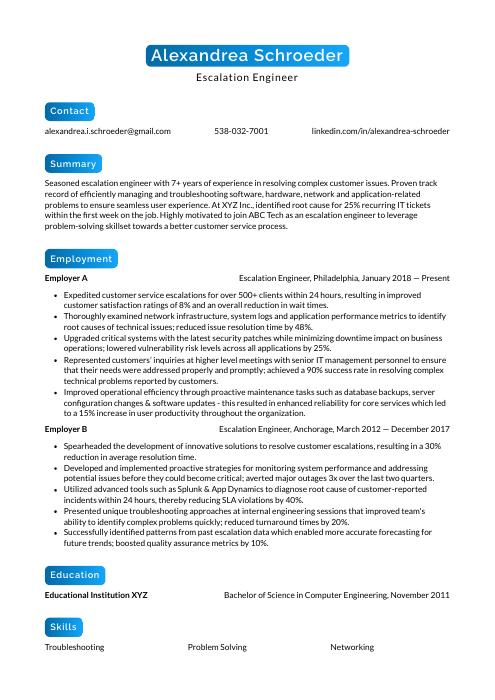 Kinkajou
Kinkajou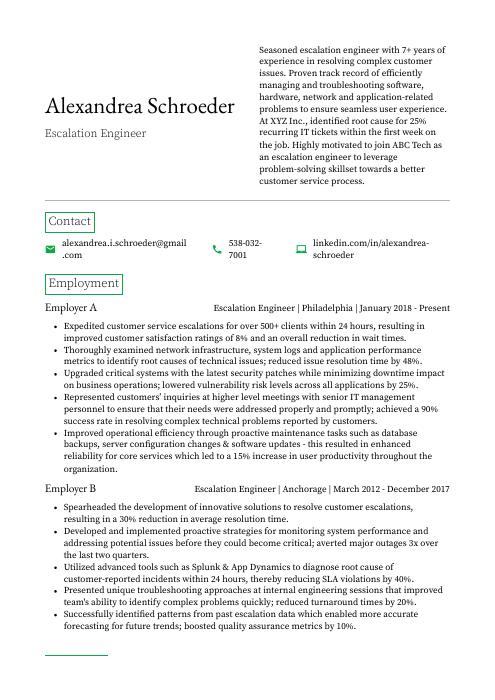 Quokka
Quokka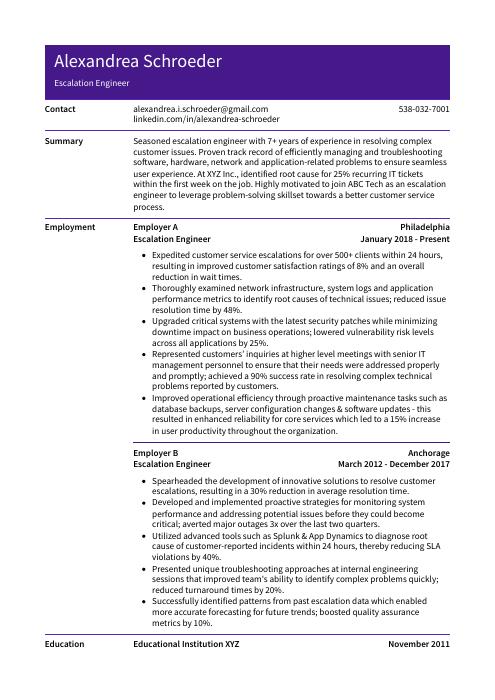 Pika
Pika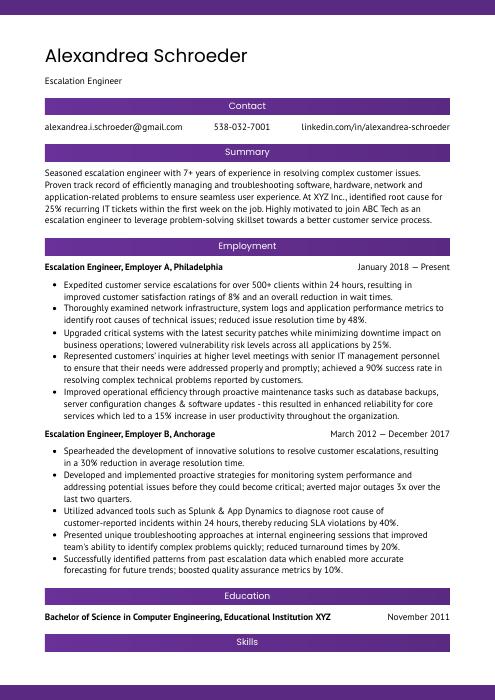 Jerboa
Jerboa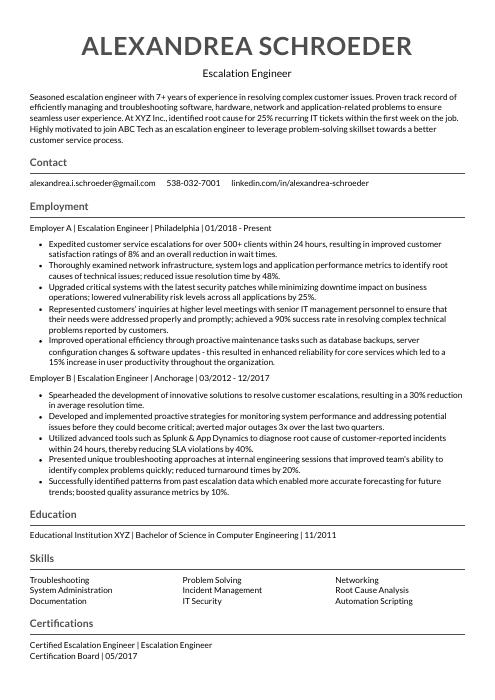 Indri
Indri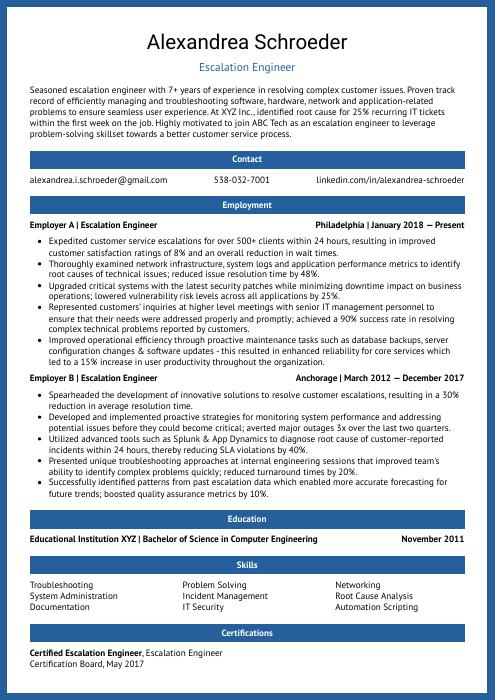 Ocelot
Ocelot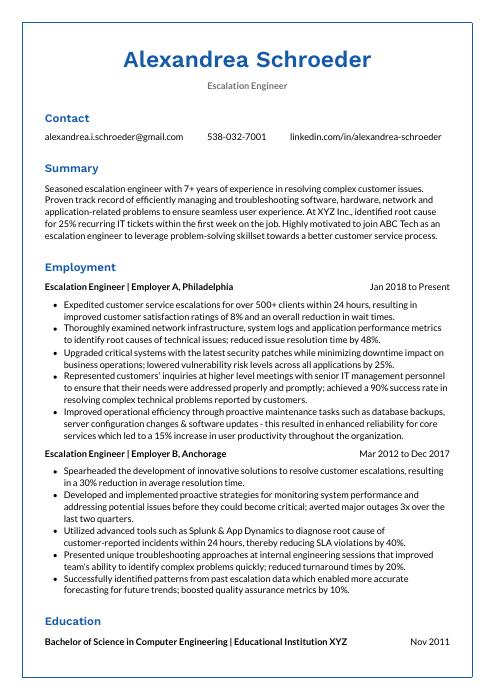 Markhor
Markhor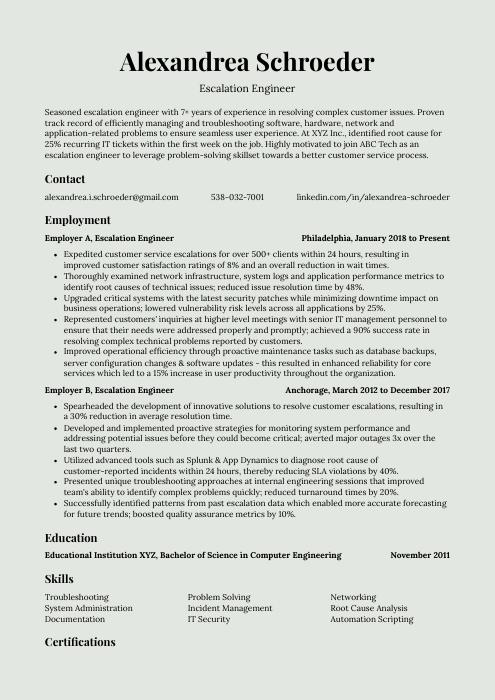 Saola
Saola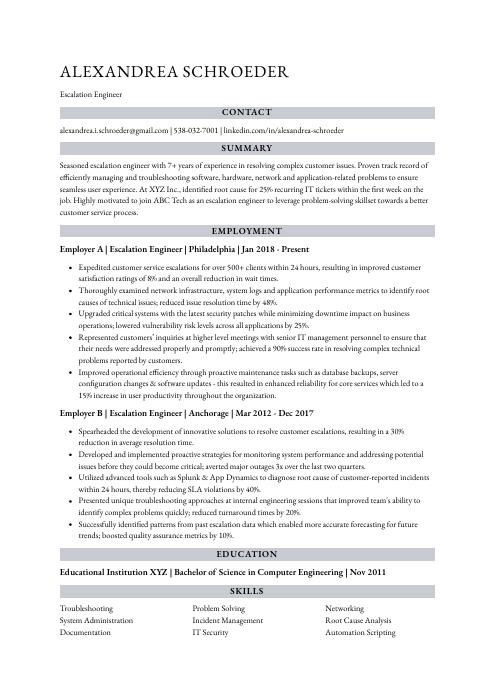 Numbat
Numbat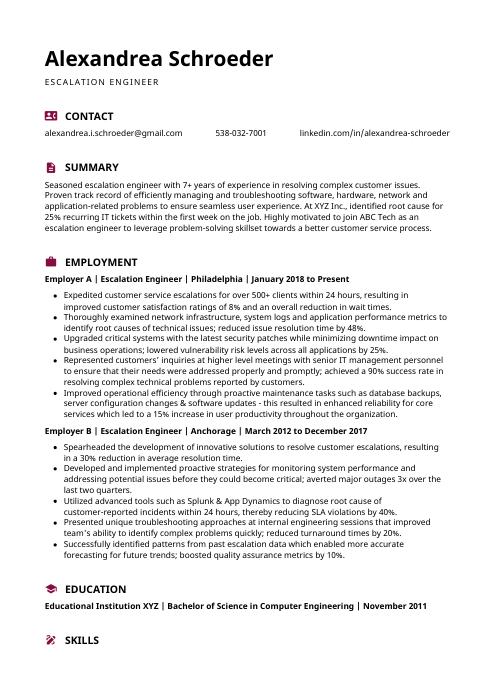 Hoopoe
Hoopoe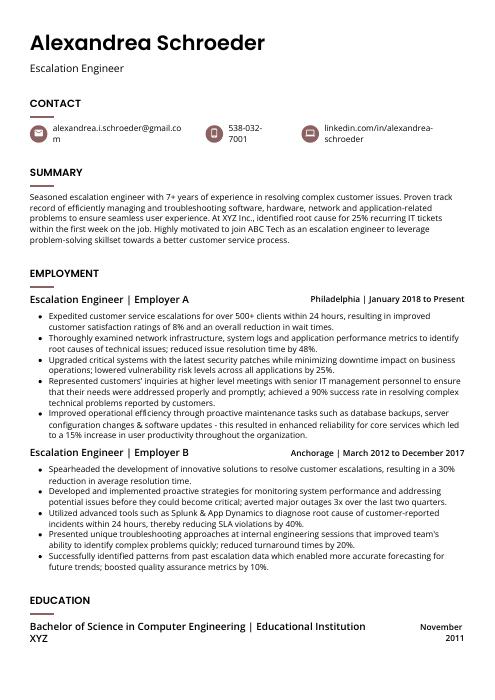 Fossa
Fossa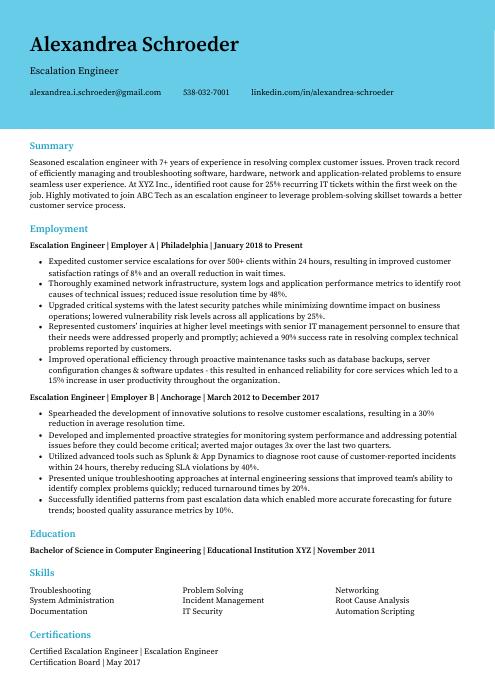 Dugong
Dugong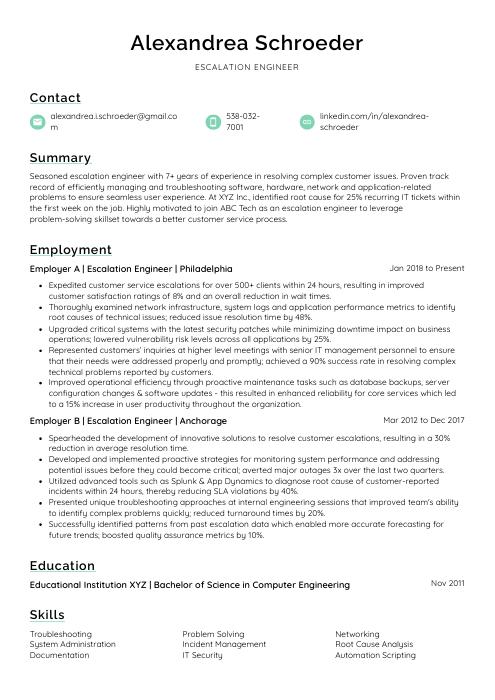 Lorikeet
Lorikeet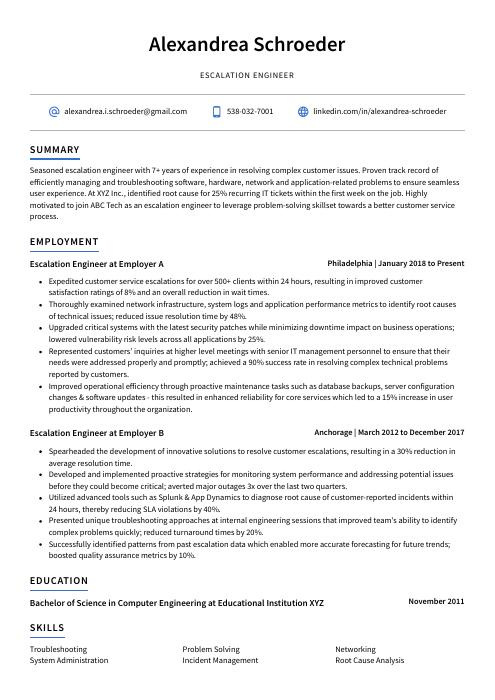 Axolotl
Axolotl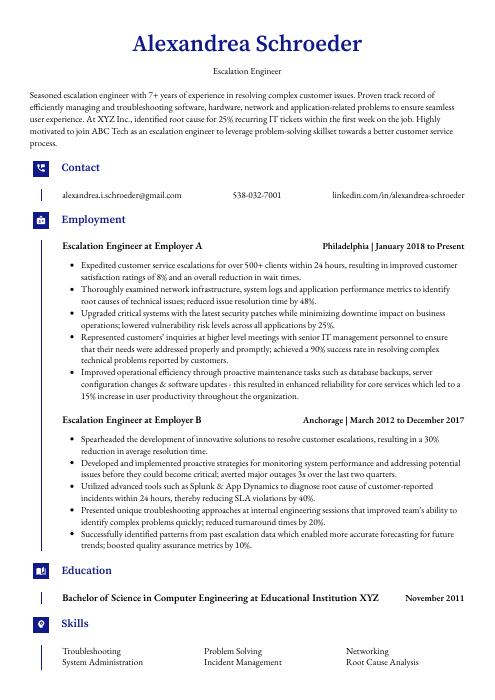 Gharial
Gharial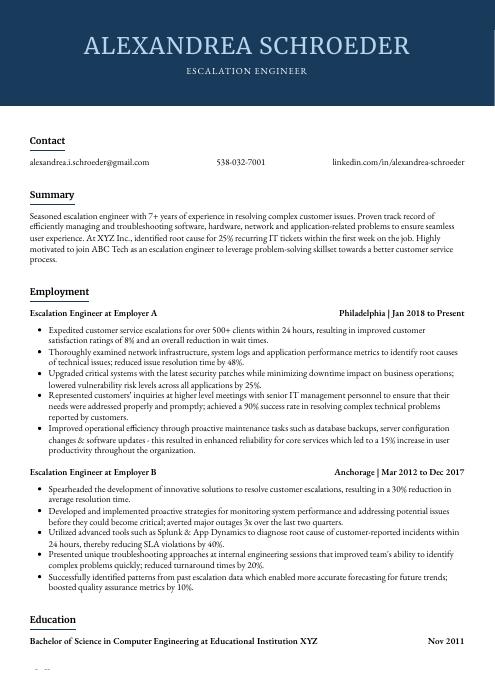 Bonobo
Bonobo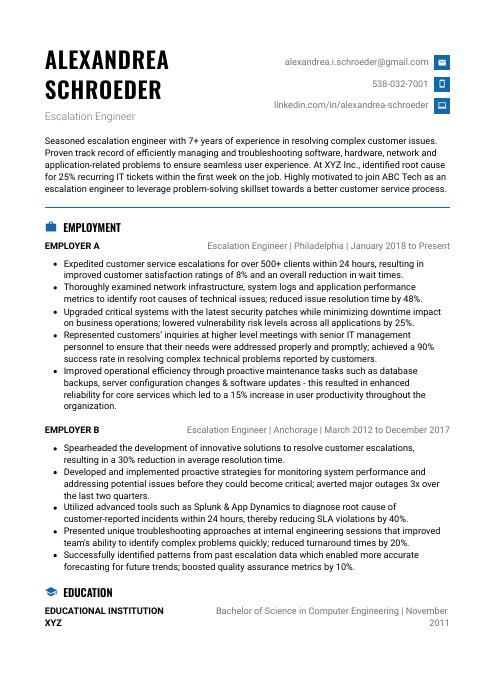 Echidna
Echidna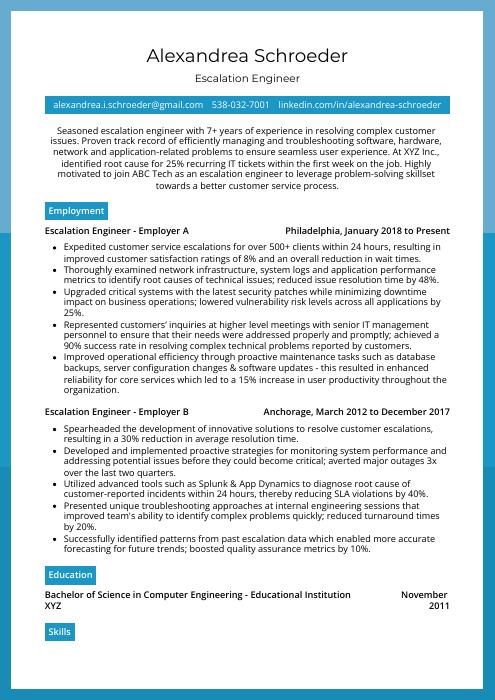 Rhea
Rhea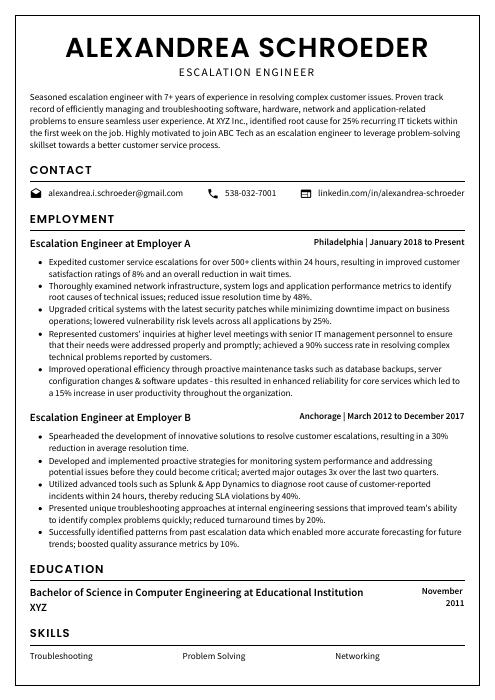 Cormorant
Cormorant Rezjumei
Rezjumei
